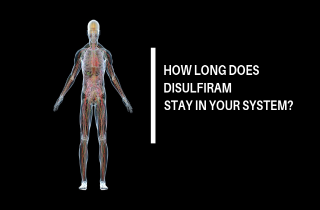Disulfiram is a medication that makes you sick if you drink. How? It prevents metabolic break down of acetaldehyde in the liver. Basically, when someone who is not taking disulfiram has an alcoholic drink, the ethanol is metabolized to carbon dioxide and water. When taking this medication, acetaldehyde builds up in the bloodstream and it produces a very unpleasant physical reaction. But how long does this effect last?
Read more here about the use of disulfiram for alcoholism and learn the details about its effects and elimination period. Then, you can send us your feedback through the comments section. We also welcome any questions you might have, and try to provide personal and prompt answers.
Main disulfiram uses
Disulfiram is a type of prescription drug used in the treatment of chronic alcoholism. Disulfiram does not have euphoric effect; instead, it deters recovering alcoholics from drinking by blocking the process of metabolic breakdown of alcohol after acetaldehyde is created. The effects of disulfiram are felt as quickly as 10 minutes after consuming alcohol and can last for at least 30 minutes, in some patients they may continue for several hours. The reaction is so unpleasant and severe that most users would rather abstain from drinking. When taken along with alcohol, side effects are related to the elevated acetaldehyde levels. These side effects include:
- dizziness
- facial flushing
- heat sensations
- heart palpitations
- hypotension
- increased heart beat
- restlessness and anxiety
- nausea
- sweating
- vomiting
This medication is prescribed IN ADDITION TO OTHER treatments that help patients reach their goal. When combined with behavioral and psychological therapies, disulfiram can help produce enough sober days in a row for patients to work on examining the reasons that compel them to drink. Understanding triggers, dealing with underlying painful emotions and learning positive and healthy coping mechanisms are really the path to long term periods of abstinence. Without these long-term efforts to make a positive changes in life, disulfiram cannot cure alcoholism and it’s not a magic pill that makes people just stop drinking.
How do you take disulfiram?
Disulfiram should never be initiated while you are still in a state of alcohol intoxication, and not until at least 12 hours after alcohol ingestion. The initial dose of disulfiram is 500mg, taken orally once a day, preferably in the morning. This initial dose is continued throughout the first 1-2 weeks and is then changed to the maintenance dose. The dose prescribed for disulfiram maintenance is 250mg once a day.
Treatment with this medication can be continued for at least 6 months and up to a year, or in some cases even longer. It is important to note that alcohol should be avoided for at least 14 days after the last dose of disulfiram is taken, because of the risk of side effects.
Peak levels and half life of disulfiram
After a single administered dose, around 80-95% of disulfiram is absorbed slowly from the gastro-intestinal (GI) tract and distributed throughout the body, while the remaining 5-20% are excreted. The half life of disulfiram is 60 to 120 hours.
How long does disulfriram stay in the body?
Disulfiram is eliminated slowly from the body. Basically, the drug can stay in the body for up to two weeks and can make patients feel sick any time they consume alcohol during that period. In fact, alcohol ingestion has been known to produce the same unpleasant effects 1-2 weeks after a person has taken her last dose of disulfiram.
Problems with disulfiram
Problems and reactions to disulfiram are possible in some patients, due to a combination of the medication and alcohol or if disulfiram is taken alone. If taken alone, disulfiram may produce toxic effects on the central nervous system (CNS), thyroid and/or skin. Any side effects and irritation caused by the medication should be reported to a doctor.
Disulfiram treatment questions
Are you thinking of getting help for your problem with alcohol, or do you have a loved one suffering from alcoholism? Disulfiram treatment can be a part of a successful alcohol treatment and help you or someone you know to kick the habit for good.
If you have any questions regarding disulfiram use in alcohol recovery, don’t hesitate to ask. We invite you to post your comments in the section at the end of the page. We appreciate your feedback and try to answer all legitimate questions personally and promptly.









Related Posts